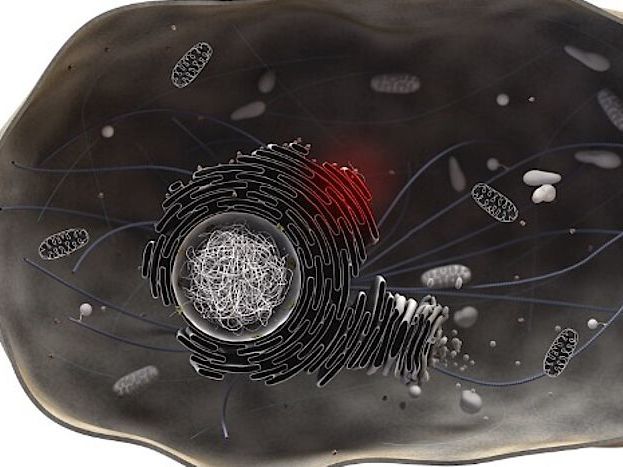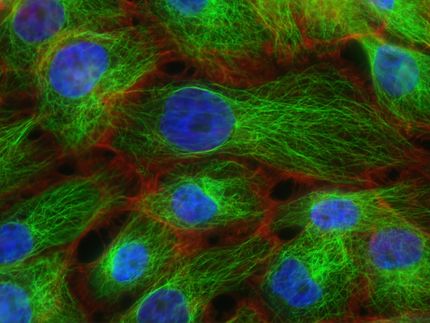Cellular stress causes cancer cell chemoresistance
Postgenomic technologies reveal new mechanism of stress-induced chemoresistance
Resistance of cancer cells against therapeutic agents is a major cause of treatment failure, especially in recurrent diseases. An international team around the biochemists Robert Ahrends from the University of Vienna and Jan Medenbach from the University of Regensburg identified a novel mechanism of chemoresistance which has now been published in "Nature Communications". It is driven by the Unfolded Protein Response, a cellular stress response pathway that alters gene expression and cellular metabolism to promote adaption and cell survival upon accumulation of unfolded proteins.

Dissecting the UPR-response with multi-omics approaches, UPR-response is depicted at cellular level red.
© Robert Ahrends
There is a broad range of mechanisms associated with chemoresistance, many of which to date are only poorly understood. The so-called cellular stress response – a set of genetic programmes that enable the cells to survive under stressful conditions – plays a key role in the development of numerous diseases and in chemoresistance. A better understanding of the cellular stress response pathways is therefore urgently required to develop new therapeutic concepts to overcome chemoresistance. "In this context, we employed comprehensive analytical approaches to gain deep and molecular insight into the Unfolded Protein Response, a cellular stress reaction induced by unfolded proteins", says Robert Ahrends, group leader at the Department of Analytical Chemistry of the Faculty of Chemistry.
Unfolded proteins cause stress and disease
The Unfolded Protein Response (UPR) contributes to cancer development and progression and plays an important role in diseases such as diabetes and neurodegenerative disorders. For their study of the UPR’s molecular biological characteristics, the researchers applied state-to-art analytical tools in the context of a multiomics approach, combining large datasets from genetics, proteomics and metabolomics. This allowed them to define the Unfolded Protein Response regulon, a comprehensive list of genes that are activated to promote cell survival under stress.
"Besides the previously known factors, we identified to our surprise numerous genes that have not previously been implicated in stress response pathways", explain the researchers, "and many of them have key functions in cancer development and cellular metabolism."
Changes in 1C metabolism
Changes in cellular metabolism are characteristic of many cancer types and promote a rapid tumour growth, as Nobel Prize winner Otto Warburg demonstrated already in the 1930s in his ground-breaking work. In their study, the researchers discovered stress-mediated genetic regulation of enzymes involved in one-carbon (1C) metabolism which relies on the vitamin folate as a cofactor. Concomitant to the metabolic re-wiring, the stressed cells became fully resistant against chemotherapeutic agents, which target this specific metabolic pathway. This includes Methotrexate, a drug commonly employed in the treatment of cancer and rheumatic diseases. Detailed biochemical and genetic investigations revealed that resistance is driven by a previously unrecognized mechanism. According to the study authors, its precise molecular characterisation might lead to novel therapeutic concepts aimed at overcoming chemoresistance in cancer therapy.
Original publication
Other news from the department science

Get the life science industry in your inbox
By submitting this form you agree that LUMITOS AG will send you the newsletter(s) selected above by email. Your data will not be passed on to third parties. Your data will be stored and processed in accordance with our data protection regulations. LUMITOS may contact you by email for the purpose of advertising or market and opinion surveys. You can revoke your consent at any time without giving reasons to LUMITOS AG, Ernst-Augustin-Str. 2, 12489 Berlin, Germany or by e-mail at revoke@lumitos.com with effect for the future. In addition, each email contains a link to unsubscribe from the corresponding newsletter.























































